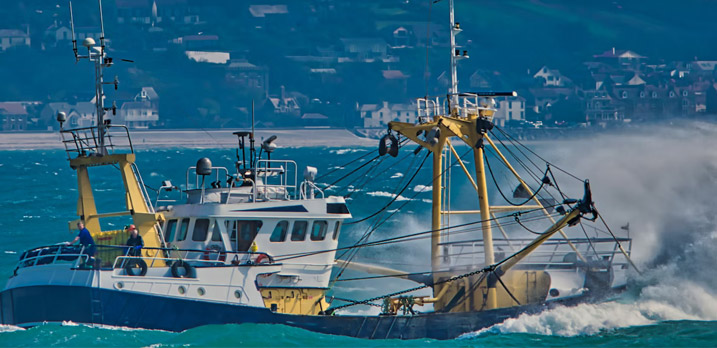
Overfishing is a persistent problem, threatening our aquatic ecosystems and potentially setting us up for a future ecological disaster. There’s hope if we all work together to create environments and shared values necessary to improve the sustainability of our collective actions.
As an angler in your own right, what steps can you take to combat overfishing?
What Is Overfishing?
Overfishing is the act of fishing so much that it threatens a fish population or an entire ecosystem.
Think of it this way. Let's say there's a species of fish that's particularly delicious, so it's a common target for fishermen. There are currently 10 million of this fish in the water, and each year, the population grows naturally by 1 million fish. If left totally untouched, the population would grow to 11 million, then 12 million, and so on. If fishers catch 1 million of this fish each year, there would be a total status quo; the population would remain roughly the same indefinitely.
But what happens if anglers catch 2 million fish each year? Even though the fish could continue reproducing, there would be a net population loss of 1 million every year. After a year, there would only be 9 million fish, and after a decade, the population would be totally gone.
Why Is Overfishing Bad?
Overfishing is bad because it can threaten specific species of fish. Over the past 50 years, commercial fishing has eliminated more than 70 percent of some shark populations – and more than a quarter of all shark, ray, and skate species are now on the verge of extinction.
This is bad for several reasons. For starters, if a fish population is dangerously low, the fish will no longer be available for catching or consumption. That may not seem like a big deal if all it means is that you have to choose a different type of fish when you go out to eat, but the ripple effect of a declining population can be much more severe.
The ecosystems of our oceans are inordinately complex. If even a single species goes missing, it can have devastating consequences for all other species in the ocean. If a predator species disappears, populations of prey species can explode, exhausting resources in the ocean until they inevitably collapse. If a prey species disappears, predator species will disappear with them.
It's hard to predict exactly what kind of long-term impact this can have, since human beings rely on complex ecosystems for more than we currently realise. But no matter what, we can predict food shortages and massive economic damage if overfishing is allowed to continue.
Commercial vs. Recreational Fishing
It's worth noting that most of the overfishing problem comes from commercial fishing, rather than recreational fishing. A person going out on the lake to catch a few fish is not endangering any local populations; the much bigger problem is waves of commercial boats catching thousands, or even millions of fish at a time. Even if you and everyone you knew stopped recreationally fishing, these commercial operations would continue.
It's also important to note that most developed countries have strict standards for commercial fishing to prevent overfishing, though these are hard to enforce. Other countries are less strict about their fishing regulations, making it difficult to protect international waters.
Big Picture Solutions to Overfishing
If we're going to truly solve the overfishing problem, we need big-picture solutions. We need regulatory advancements or massive shifts across multiple cultures to get more people on board with the idea of environmental sustainability. Strict fishing limits, better enforcement, and agreeable solutions for how to manage international waters are great places to start, but these have historically been difficult to accomplish.
What You Can Do
These are some of the most important things the average person can do to combat overfishing in their own life:
- Closely follow fishing regulations. Always pay close attention to local fishing regulations and adhere to them closely. Depending on where you live, you may need to get a fishing license before you can fish, and you may be subject to strict upper limits about how many fish of different species you can catch. These rules may be hard to enforce, but that's no excuse not to follow them; these restrictions are set in place to ensure the sustainability of the aquatic environment.
- Select certified sustainable seafood. If you're craving seafood, make sustainable choices. You can choose to eat fish that you've sustainably caught yourself or select certified sustainable seafood you’ve found in the grocery store. Also, locally caught seafood is always preferable to alternative options from a sustainability standpoint.
- Reduce food waste. Whenever possible, reduce food waste. Only buy as much seafood as you’re going to eat and do whatever you can to keep it from going bad. Reducing your seafood consumption can help reduce total demand – and make sure every caught or bought fish is put to good use.
- Donate to good causes. Many non-profit organisations, like FishAct, have stepped up to provide education and resources to the cause of ending overfishing. If you have some extra money, you should research some potential options and donate it; your money can help to make a real difference.
- Raise awareness. You can also assist the cause by raising awareness of it. Many people who eat seafood regularly don’t understand how bad the overfishing problem is; each new person you teach is a potential new ally for the cause.
Overfishing isn't a problem that’s going to disappear overnight; it's something that we're going to need to work on collectively, and probably for many years, to see a meaningful change. In the meantime, enjoy your fishing expeditions responsibly and in the best comfort you can afford. If you're in the market for your next fishing boat, consider buying one of our endless options for new and used boats for sale. And if you're ready to sell your boat, we can help you with that too!